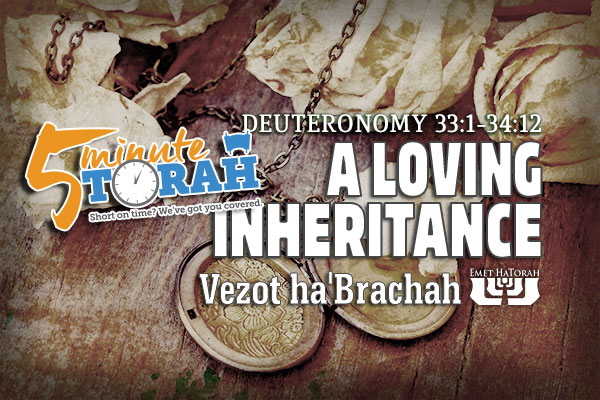Parashat Vezot ha'Brachah - Deuteronomy 33:1-34:12
Series:

The Loving Inheritance
In our morning prayers, one of the first passages of Scripture we recite is this: Torah tzivah lanu Moshe morashah kehillat Yaakov--The Torah Moses commanded for us is a possession for the congregation of Jacob. This is taken from our current Torah portion:
Yes, he loved his people, all his holy ones were in his hand; so they followed in your steps, receiving direction from you, when Moses commanded us a law, as a possession for the assembly of Jacob. Thus the LORD became king in Jeshurun, when the heads of the people were gathered, all the tribes of Israel together. (Deuteronomy 33:3-5)
This passage should remind us of a few things. First, it reminds us that the Torah was an inheritance given to the Children of Israel through the hand of Moses. It was not given to them as a ball and chain, or a burden, or a mockery (“You can’t keep it!”), but a loving inheritance from the One who delivered them from the yoke of slavery. The Torah is a gift from Hashem to a redeemed people in order to define the parameters of what it means to live a righteous life.
Second, this passage reminds us not only that we are to always give another person the benefit of the doubt even when they have let us down multiple times, but also that we can never become who we were intended to be until we are unified with our brothers and sisters. How do we derive this interpretation? Let’s look at the very next verse:
Thus the LORD became king in Jeshurun, when the heads of the people were gathered, all the tribes of Israel together. (Deuteronomy 33:5)
This verse is unique in that it calls Israel by an unusual name, Jeshurun. This word is used only four times in the entire Bible, and three of the four are found in these final words of Moses. Jeshurun (Hebrew Yeshurun) is a word that means “upright.” Moses uses this term to describe the Children of Israel in their ideal state, a nation who is wholly upright and righteous before the LORD. Although Israel has had less than a perfect track record throughout its forty years between Sinai and where they stood at the border of the Promised Land, Hashem holds out hope for them by seeing only their potential future and not their stained past.
Commenting on the phrase, “when the heads of the people were gathered,” Rashi cites an ancient commentary to show that Israel can become Jeshurun only when they are united:
When Israel is gathered together in a unified group, and there is peace among them, God is their King, but not when there is strife among them. (Rashi, referencing Sifrei Devarim 346)
A little later in this passage in Sifrei, it adds, “when they constitute one unit, and not when they are divided into many factions.” Although the Jewish people in the time of Yeshua were absorbed in performing the duties prescribed by the Torah, they were divided into many factions. Eventually, the Zealots brought down the hand of Rome upon Jerusalem and the entire population of Israel through their infighting and terrorist activities among even their Jewish brothers and sisters. Yeshua testifies to this by warning his disciples, “Beware of the scribes, who like to walk around in long robes, and love greetings in the marketplaces and the best seats in the synagogues and the places of honor at feasts, who devour widows' houses and for a pretense make long prayers” (Luke 20:46-47). This is why Jewish literature is able to claim that the Second Temple was destroyed due to sinat chinam, baseless hatred.
John says it this way:
If anyone says, “I love God,” and hates his brother, he is a liar; for he who does not love his brother whom he has seen cannot love God whom he has not seen. And this commandment we have from him: whoever loves God must also love his brother. (1 John 4:20-21)
When we are religiously devout and a staunch seeker of truth, but can’t get along with our brothers and sisters, then we are nothing more than a spectacle and a stumbling block. Paul wanted his disciples at Corinth to understand this principle and gave them one of the most beautiful insights into this principle in his famous “Chapter of Love”:
If I speak in the tongues of men and of angels, but have not love, I am a noisy gong or a clanging cymbal. And if I have prophetic powers, and understand all mysteries and all knowledge, and if I have all faith, so as to remove mountains, but have not love, I am nothing. If I give away all I have, and if I deliver up my body to be burned, but have not love, I gain nothing. (1 Corinthians 13:1-3)
When will Hashem be King over Jeshurun? When love and unity are the fruits of the people of God. Let’s start today by building bridges rather than burning them, and loving our neighbor as ourselves.
Chazak! Chazak! V’nitchazeik! Be strong! Be strong! And may we be strengthened








